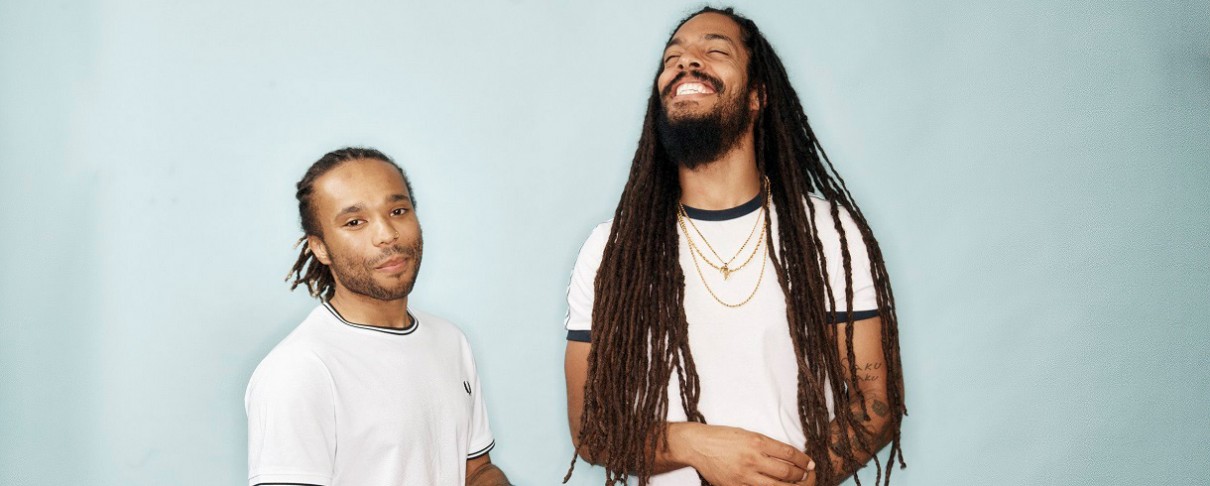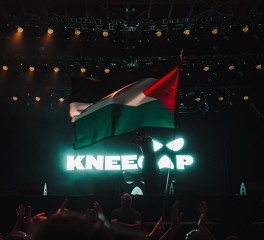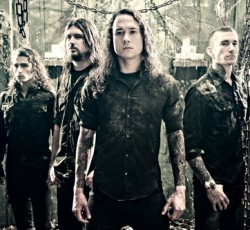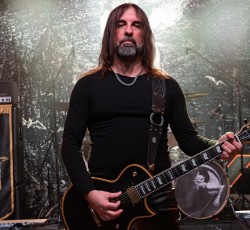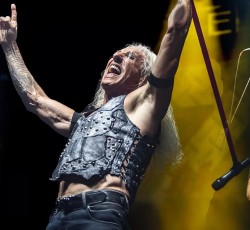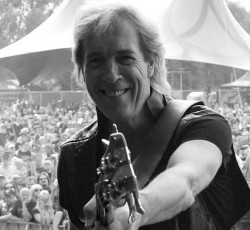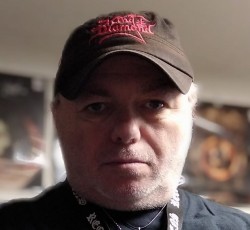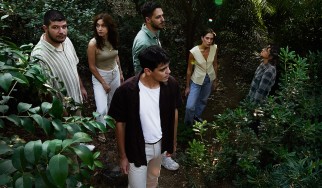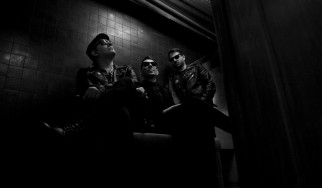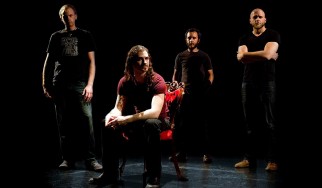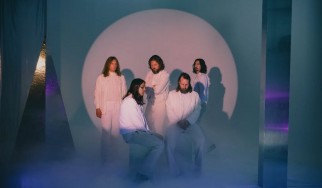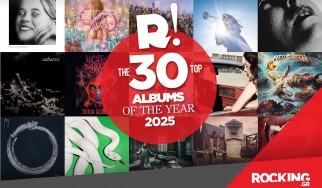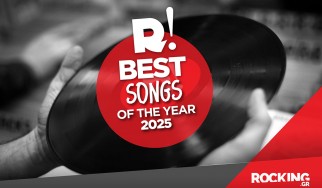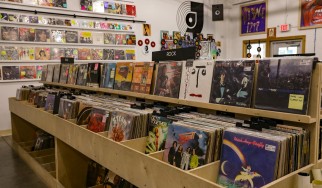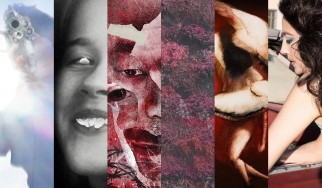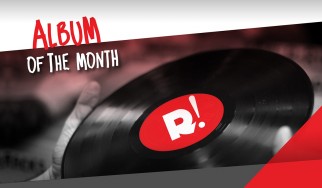Bob Vylan: "Our rejection by labels and PR agencies was a blessing in disguise"
Frontman Bobby in a torrential, all-encompassing interview about every aspect of the explosive British duo before their first appearance in Greece on behalf of Release Athens
Μπορείτε να διαβάσετε την ελληνική εκδοχή της συνέντευξης εδώ.
Every day that we have the pleasure of talking in depth with a new, great voice of the modern alternative sound is a beautiful day. Even more so when we are going to see her live in our part of the world. Thus, the news that Bob Vylan, under the curation of Release Athens 2025, will appear for the first time in our country, was one of the most beautiful of the concert season.
The duo of Bobby and Bobbie, has been around for eight years and has managed, through three full-length albums, to be considered one of the most explosive and refreshing contemporary rock bands. As you will see below, in the torrential interview that frontman and main composer Bobby gave us, Bob Vylan is not a simple case of a band. From combining grime/hip-hop with punk/hardcore, to the broader representation of the black community in the rock industry and DIY underground today, and from the rejection of their debut by record labels to their sharp performance at Coachella, Bob Vylan is a band with an artistic point of view and a coherent political perception. And that's all they have to say.
Questions by: Apostolis Zamparas
Interview by: Eirini Tatsi
Edited by: Apostolis Zamparas & Eirini Tatsi

Welcome, I'm Eirini, representing Rocking from Greece. How are you today? How is the spring evening finding you and where?
I'm good. Thank you. I'm in New York at the moment. We've just finished a U.S. tour and we've been working on some stuff in the studio out here as well. So yeah, it's very rainy, but it's nice to have some time off and not be on the road.
Alright, that's good. I want to start a little bit with the basics because you know here your sound is something new to the Greek audience. So why Bob Vylan? How exactly did you choose that name?
It's just a play on words of Bob Dylan. That's it, really.
And both of your names I would imagine.
Yes, of course. But yeah, we could have called the band anything, but I just thought it would be funny to call it.
Yeah, it actually makes a kick. Everybody gets the wordplay, it's the person that most people recognize. So to get a little bit further into your sound, the music that you write combines elements of punk/hardcore, a little bit of grime, little bit of hip-hop. Do you consider yourselves a part of a particular scene, or do you just want to do your own thing by combining so many different influences?
Well, yeah. I mean we end up to a certain extent by default, being part of a scene, like the punk scene. And happy to be so, we're a punk band and it's a scene that we embrace and that has embraced us.
Do you feel that most of the music genres that you choose intersect in some way? And what is basically the main thing that you look for, in your sound in order for you to work with it?
It's not really such a conscious thing in that sense. It's more of picking up the guitar and just seeing what comes out. It just develops very naturally. It's not really a thing that's premeditated in terms of the sounds that we're going to use, to create this song, or the next song, or what not. It's just what feels right.
I see. Lyrics come to be as important as the sound itself. So when you write a new song or a new record, what comes first? Do you start with the lyrics or do you start with the guitar and the writing process?
The majority of the time it starts with the music. It starts with the guitar or, some sort of musical sound, be it a sample or drum or guitar or bass. Or whatever. Very, very like here and there, once in a while, it might start with lyrics, but more than usual, it starts with a musical element, the guitar or bass or something like that. And then the lyrics kind of develop around.
I've had something in mind lyrically that I've been wanting to say or trying to say and then this riff in particular maybe provokes that
At certain points in history, you see how the political landscape or economic landscape gives rise to different bands and different music
I see what you mean. The fact that you're very vocal in what you do. And I think that during the previous decade, there was, a new rise on the British hardcore and punk bands taking over. Also the grime scene. In the same way as you compete with the marginalization in the local communities, being oppressed by the new political turmoil, especially in your case, there was also the Brexit. Do you feel that there is a need again for artists to be more controversial, speak more about the political turmoil and rise up to what is going on?
Yeah, I suppose. At certain points in history, you see how the political landscape or economic landscape gives rise to different bands and different music at the time. And I think that's just a similar thing, that's happened, over the last maybe 5-6 years or so in the UK. It's been maybe slightly longer, but it's been a similar sort of rise, a continuously kind of bleak political economic landscape and naturally artists find themselves talking about these things. But as far as Bob Vylan is concerned, this is something that we've always spoken about because we're one of probably the few bands that realized that lots of this stuff was happening before Brexit or any particular political party was in office, so this is something that's very much in our blood and in our life, just in general, this kind of awareness of our political and economical struggles as a people, and I suppose that comes from the fact of how we've grown up.

I really admire the fact that you have been vocal about the unfairness of the world, but also you have been critical of also many of the left-wing politics of, let’s say, liberal organizations. So how do you manage to keep your message unfiltered and libertarian while condemning the right wing, but also criticizing the left. Do you feel that you have been criticized, let's say a little bit too much for it?
I think it's not really something that we think all that much about in terms of the consequences of it, because it's just the truth, you know. We're just telling the truth. And so whatever the consequences are for telling the truth, we will face them. It doesn't serve us to be worried about the fallout due to something that we've said, if that something is the truth.
Rock, as in its initial creation is a black music genre
An important thing that I have noticed too is to also be very vocal about your racial identity through your lyrics, and how racism affects that. I think that in the past few years in genres like, punk music or even rock and metal, the representation of the black community, at least from what I would consider from where I’m standing, was not that big. But for a few years now, I see darker and harsher genres to be more representative. How exactly do you view this from your own point of view, if you recognize it?
It’s tricky I suppose. There have always been people of colour involved in punk music and rock music. I mean rock, as in its initial creation is a black genre. It burst out of the blues, so it's interesting because at some point in history, these genres stopped being seen as, "black music genres". Well, you also have to look at the fact that rock music, as popular as it is, is not as popular as it was, and now the popular music is rap music or hip hop music, and that is what dominates. The playlists, the streaming services, the radio, even in pop music with artists like maybe Sabrina Carpenter, who's a fantastic artist. There are still elements of R&B and hip-hop in her straight down the line in contrast to rock music and punk music, who I suppose are more quite "niche in" comparison. We are now seeing that niche to get opened up a little more to people of color who are maybe embracing it a little more because they're looking outside of what it is, what they're told they should be. Into what they're told they should take part in, and they're rejecting that, they're rejecting those norms.
And they're like "what if I want to be part of this? This is something that I too can be a part of. And I can too, be involved in". And then once you start to look at the history of it, you see, we were always involved in it. We were always part of it and that, in certain junctures; we were creators of this thing. I don't think you would find a music historian that would disagree that rock music has birthed out of blues music, which is, or was, an almost exclusively black music genre. And so I think it's a natural kind of pushback from certain communities, maybe to not be pigeonholed and to find themselves represented in other musical genres, than those they've always had a relationship with.
We're an independent and political band that has had a number one album in the UK
It was a very interesting approach. So in your beginning when you were first about to release the album, "We Live Here" back in this dreadful 2020, you were initially rejected by record labels and PR agencies, due to the extremity of its lyrical themes. But when you look back, do you think that this was an important step for Bob Vylan’s breakthrough?
Absolutely. I was, speaking to a friend yesterday or two days ago mentioning how it was, the fact that we had been rejected by labels and PR agents and all of these kind of I suppose mainstream or by people that were more commercial, and part of the industry, and it was a blessing in the skies, it's allowed us to create something that we haven't really seen being created in this generation of punk music, which is a band that is independent, releasing their own music and still having a somewhat commercial success, and a mainstream success in terms of rock and punk music. And so we're an independent band that has had a number one album in the UK.
We're an independent political band that's had a top 20 album where we've been able to play down near every festival that any signed band or artist plays. We've been on national television multiple times. It's a success that we've managed to have, despite attempts to sideline us as a band by certain parts of the industry. And so it was a blessing because it allowed us to continue to get our message out there in a way that was uncompromised and be true to ourselves and it's something that I would encourage and I do encourage other bands to do, to believe in themselves and find ways to get their music out there without compromising, even if they get pushed back or knocked back from certain mainstream or commercial parts of the music industry.
Ιt's a question about what it is that you want, a band. If your ethics and your morals can be compromised and you want to just be a star, take the quicker and easier route
I want to ask how difficult is it actually today or at least the past few years for an underground punk or grime band to release an album at first, and then how much worse it is to book a show and tour the UK with so many small venues closing down, especially after the global quarantine.
It is not easy. And I'd be lying if I said that it was, but it's a question about what it is that you want, I suppose as a band. And if your ethics and your morals can be compromised and you want to just be a star, well then, take the quicker route, possibly the easier route and have someone put in all the leg work for you and maybe they take ownership of your masters and your publishing. They take a percentage of your merch and your live shows and your record sales and any brand deals. That’s an option that is for each band or each artist to make individually, but because it's not easy, it's very hard, but it's worth it.
And I suppose you have to put in that grind of finding a way to record the music yourself or put together a team of people that believe in the vision that can maybe help you record the music and mix and create maybe an album. But I'm not coming from a privileged place so I know exactly what it is to work and put that money that you make from your normal day job, whatever it is, into your thing that you have a passion with. And I know what it's like to buy merch with my money that I've made for my day job and try sell it at shows that we've booked ourselves and playing music that we've recorded and mixed ourselves and so it's hard for me to hear and support any band or any artist. It’s a choice of whether or not you want to do it. And we decided that we wanted to do it.
And so we did it when we got that pushback, we decided that we wanted to do it even more, and I e-mailed venues. I e-mailed promoters to try and get shows, I e-mailed everybody I could to try and get a show, to try and get a booking somewhere.
And we went and played tiny little bars and we made enough money just to travel on a bus and back. And that was all for the love of what we were doing, but also in the belief that we had something to offer to this genre of music, but first and foremost, we loved what we were doing. We loved playing shows. It didn't matter if there were only five people there, we played like there were 5000 people there. We were enjoying ourselves and I think that's the thing. If you just enjoy yourself while you're doing it, it makes it a little easier.
Ιf the low-capacity venues shut down, the new bands will have to rely more and more on social media or going viral in order to be seen
In terms of venues shutting down, that is an unfortunate truth due to lots of reasons. Governmental neglect, particularly around the lockdowns and then COVID and the lockdowns themselves also have contributed to a lot of those venues shutting down now. Landlords as well are another reason as to why these venues have shut down and it's a shame. Because there are venues that we played when we first started out as a band 7 or 8 years ago that are just not open anymore and they're venues that gave up-and-coming bands a chance.
Also some that are shutting down maybe just didn’t adapt in the way that they needed to in order to survive. And unfortunately the live music scene and the industry around live music is not what it once was, especially for venues of a lower capacity. And so there had to be kind of clever ways in which they would adapt to reality, in order to stay afloat and survive. And for some of them, I suppose it was hard to do that. And it's a shame because now, there wasn't as many venues in the UK for smaller acts to play, and that's something that has a knock on effect into the wider music industry, because now, where is a new band going to develop their talent of playing shows, where are they going to learn to interact with the crowd? Where are they going to learn to navigate the pitfalls of a live music industry? How are they going to learn all of these things if the low-capacity venue is now shut down, where they're going to learn that. Now, they have to rely more and more on social media or going viral in order to be seen because they're no longer being seen where they should be seen historically.
And so it's tricky. It's a shame. It really is a shameful reality.
Τhe underground scene in the UK is not really all that underground, unlike that in America
Are you still in contact with the underground and possibly the DIY scene in the UK? Or has it become a little bit more difficult for you since you have started touring so hard?
I think we retain our connection because of the way that we operate as a band. We're not in, per say, I suppose the industry, but we kind of dip in and out when we need to. But I think the underground scene in the UK is not really all that underground. It's not like while I'm in America, I noticed there was kind of quite a difference between New York, for example, underground punk shows and a more mainstream punk show. There is a bit more of a divide, whereas in the UK it's not, so it's not so prevalent.
Everybody is rubbing shoulders with one another and aware of one another, no matter where they are in their career, whether they're playing small shows or big festivals, people are kind of aware because the country is small and so the scene is very small. And especially when you kind of narrow that scene down to a local level, like the London scene, everybody is aware of this or that band no matter where they are in their career.

Do you have a couple of new bands from your local scene that you would like to recommend?
Yeah, I mean, I like a couple of bands that I'm constantly championing. One of them is called Panic Shack and they're a Welsh band that’s absolutely incredible and they've been on tour with us a couple of years ago now, but they're an absolutely incredible band and then there's a band called Problem Patterns who are an Irish band that is just absolutely amazing. And they're working on new music at the moment. And then there's Jen, which is TENNA, which is a great band and again very independent and DIY, creating music that is just absolutely incredible. They’re the three that come to mind right now, but I'm sure there's a bunch.
Τhe journey of an artist is not separate from the journey of the individual
How was the creative process and the evolution of your sound in the next albums, "Bob Vylan presents The Price Of Life" and "Humble As The Sun"? Your evolution, was it something that came naturally or were you aiming to develop your music in a certain point?
I think it's an ongoing journey as an artist to just continuously develop and grow because the journey of an artist is not separate from the journey of the individual. And as I grow as an individual, I naturally will grow as an artist and that growth is like another word for change.
And so "We Live Here", it's a very punk album, it's very DIY. It was made in my bedroom with very little outside help from anyone in terms of production. I mixed it all myself and I paid somebody else to master it. That was the outside help and I think a friend of ours added one additional guitar on one track and it was because it was something that I couldn't technically do myself because I didn't have the technical capacity to do it. But that's a very punk album.
And then "..the price of life" again was made in the bedroom, but it was with slightly more outside help, so again I think lags maybe contributed additional guitar on one track. Josh from The Skints have played guitar on a track and their bass player played bass on one of the tracks, Bobby from Strange Bones also contributed, so like there was a little more outside involvement, even though it was still done in the bedroom, simply because I didn't have the finances to take it into the studio and mixed it all myself properly. And just again I paid somebody to master it and so.
There’s two years between those albums and as an individual I had grown, but also as a businessman, I had grown. So, to release our debut, I had to accept that I am going to be the record label, I am going to be the manager, the A&R for this project and the executive producer. I am going to be the head of the business for the music and for the band. Then you're entering the business side of it.
The creation of it is artistic, but the release of it is business and so between those two albums, I had grown as a businessman. And I think, naturally, that kind of influenced how it was perceived and how things had developed. Because if I was putting on my A&R hat, I'm looking at certain things now and I'm saying, "OK well, where does this fall in the wider landscape of rock or punk music?" And I look at things I say "Ohh well, that actually has the capacity to be a single". And this song might be able to go on the radio. Or can we actually remove that and have it stand a better chance of getting on the radio, if it's needed to emphasize something or do what’s necessary to make the track better. All of that, kind of informed the growth as well.
And so when it got to "Humble as the Sun" and I finally was in a studio, it just kind of grew and there was again more outside help with production and mixing and stuff and. I had enlisted a producer to help me get these tracks to a certain point and with the mixing as well. And it was also again like an evolution. I don't want those three albums to all just sound the same. I didn't want them to all sound like "We Live Here", and so "Humble as the Sun" had some softer elements while our debut was relentless in its aggressiveness and "Humble as the Sun" has some instances of being quite vulnerable, especially on the intro track. So I think there is continued growth that I wish to have as an artist and as an individual to be more vulnerable and allow for people to see a wider, more well-rounded depiction of what the band is, and I suppose myself as the mouthpiece for it.
Crass, or Rage Against The Machine or System Of A Down, whether it's Ice Cube or Dead Prez or Public Enemy, they are artists that I look at
Back in the day in especially the video clip for the song "We Live Here" you were wearing a Crass t-shirt, showcasing influences from the anarcho-punk scene. How important was and still is for you, as artists and political beings this part of music history?
I'm somebody that is happy to wear their influences on their sleeve. The Crass T-shirt again, it wasn't a planned thing. It was a clean T-shirt and we had to shoot a video that day. And so I just put it on. It was the thing that grabbed a lot of people's attention. I was aware that this song "We Live Here" is very much somewhat in line with the ideals and morals that Crass held or hold as a band. And so there was some kind of thought there, but those kind of political bands whether it's something like Crass, or Rage Against The Machine or System Of A Down or something like that, whether it's kind of very punk rock or very, more of a mainstream rock sound, are important to me because they're the artists that I look at.
And the same when it comes to rap music, whether it's Ice Cube or Dead Prez or Public Enemy, they're artists that have been vocal about the situation that they're living in, and have been able to stay true and that’s an important thing to have in this world and hopefully can be that inspiration for another band coming up.

Now, from influences to collaborations, you have released quite a few songs with other artists such as Amyl And The Sniffers, Bloody Beetroots, Bad Omens and others. How exactly do you choose your collaborations?
The funny thing is, in the majority of them, those collaborations they found me. The collaboration with Amy from Amyl & The Sniffers, is one where I reached out to her because I had this idea of doing an alternate version to a single that we released called "Dream Big" from "Humble as the Sun", and we did that together.
But when it comes to the majority of collaborations I think there're only two songs that we've made in our entire catalog that actually has anybody else doing any kind of vocals on and one of them is on "We Live Here", called "Pulled Pork" and that was me reaching out via a friend to Jason Butler from Fever 333.
There’s four years, five years between both of those collaborations, everything else like Bloody Beetroots or Strange Bones, they reached out to me to do the vocals. Often, I am friends with the majority of people that I have collaborated with. So there's very few instances where it's just like someone has put us in a room together or something like that. Sometimes there's maybe a managerial connection with, our management being like "we're in the studio at the moment with this band. They got this great song. We told them that you would work well on it. Do you mind if they send it over?" And that was what happened with Bad Omens. They were working on this alternative project to the album that they released and they have the same management as us. And they reached out and sent the song and I was like, yeah, this is wicked. But a lot of times there has to be some sort of organic connection there.
Alright. Is it somebody else possibly that you would really like to work with?
Yeah, there's a ton. I'd love to work with M.I.A.. I'd love to work with Ice Cube. I'd love to work with Ice-T, Zach from Rage Against the Machine, Run the Jewels, Serj from System of A Down. I would love to work with him. I just think he's incredible. There’s an endless list.
I think there are plenty of people in the UK and throughout of Europe that are quite jealous that they're not going to that festival with the Prodigy and Pendulum
Let's get a little bit into live shows. You're actually coming for the first time to play here in Greece this summer in Release Athens Festival together with Prodigy and Pendulum. Are you excited about that? What do you expect from Greece and what we should expect from you?
Yeah, we’re extremely excited for that. I've been to Greece, but never played a show there. And for the first show that we play in Greece to be this festival with the Prodigy and Pendulum, I think it's gonna be incredible. You know it's almost a dream line up in a sense.
I think the crowd is going to have the time of their life, with these three bands all on one bill, I think there are plenty of people in the UK and throughout the rest of Europe that are quite, quite jealous that they're not going to that festival, that it is not happening closer to home.
And you also performed recently in Coachella Festival a few weeks back with a very sentimental performance, changing the lyrics to "Pretty Songs", to cater the Palestinian people and the ongoing genocide. But I believe you are aware of the aftermath of what happened there. How do you experience this situation in the music industry today, its "tolerance" to radical political expression, while at the same time suppressing it, is it better than the past, or is it weirder?
I suppose I can't really speak on it in terms of how it was in the past because I didn't experience it then. I've experienced it in the last eight years personally because we've been a band for that length of time. We’re certain that if we're not performing Coachella, if Kneecap are not performing Coachella, if any of these bands that are Coachella, that are speaking up for the Palestinian people and speaking against this genocide that's happening, If they're doing it at 100 cap venue with 50 people, no one cares. It's not going to make the news. It's not going to be on social media.
Not that it's not important to do so when you're in that position but, I just mean to say that it's not going to make headlines. And the same people that are upset, had they stumbled across that venue with 50 people in and saw your band saying, well, "Free Palestine", they might just look at it and be like, "who cares?".
Any band that speaks up against what's happening to the Palestinian people should be aware of the fact that it could have a negative effect on their career, but they should also know that they're doing the right thing
But once the platform becomes bigger and once there’s visibly more people in the room and you seemingly have more influence, then people will become upset at the things that you say, if they don't necessarily fit with their political beliefs. People have realized that, bands have a lot of people watching them and a lot of eyes on them and they have become upset that they're using that platform, their platform, for challenging their political beliefs.
It's an important thing to continue to address the truth. And so there's no point in worrying about the fallout of it because it is the truth. Any band that speaks up against what's happening to the Palestinian people should be aware of the fact that it could possibly have a negative effect on their career, but they should also know that they're doing the right thing.
And there would be some peace of mind in that.

OK. So you mentioned in the beginning now that you are taking a little bit off touring in New York about writing some new stuff. So what are some possible future plans for Bob Vylan?
We’re working on new music but we have a lot of festivals and we have some touring that we're doing later in the year with Gogol Bordello throughout Europe, which I'm sure will be fun, and then looking at other touring plans. But at the moment we're enjoying sharing "Humble As The Sun" with people and continuing to do that, and we look forward to sharing new music.
But yeah, aside from that, it's just looking at other opportunities, other ways that we can be creative and other possible artistic endeavors that we can find our way into and I have plans for. For certain, acting, screenwriting are some things that are being worked on at the moment. And so it's all quite exciting in terms of being able to be creative in different ways and to continue to be able to do.
So, to wrap this up. Which are your five albums that you have on rotation the past few months, let's say, what are the five albums that grab your attention and fill your creativity?
Well, I don't know what I've had on repeat, especially be honest. I've been listening and listening to a lot of audio books, so I've been listening to Macbeth. And I've been listening to Romeo and Juliet. Not tons of albums I've been getting played recently. I've been listening to this album called "Bent", from an artist called DoFlame. Also "Tell Dem It’s Sunny" by Greentea Peng. And I can see on my Spotify an album that I continue to kind of revisit is "Pet Sounds" by The Beach Boys (well that’s a coincidence). So not the most recent offering musically.
Thank you so much for being so vocal about everything and taking the time for this interview. I would like to let you have the final words.
Drink water, eat your vegetables and free Palestine.



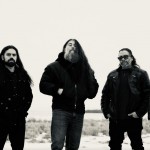

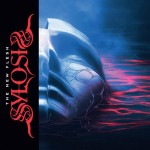
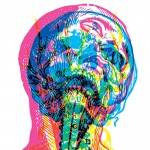
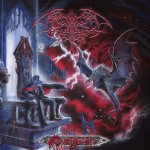


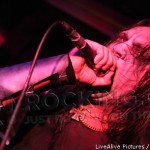

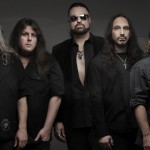
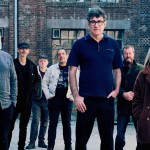
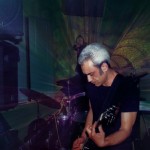
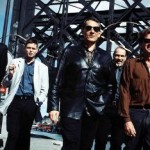

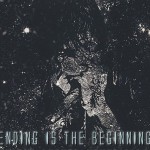
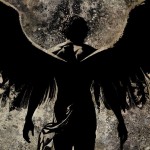
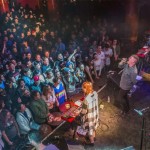


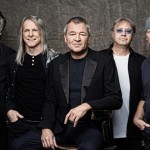
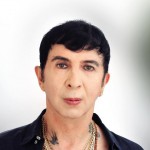
![[Βιβλίο]: Bob Dylan - 100 Τραγούδια](https://images.rocking.gr/articles/2017/150x150/bobdylan100tragoudia-cover.jpg)

